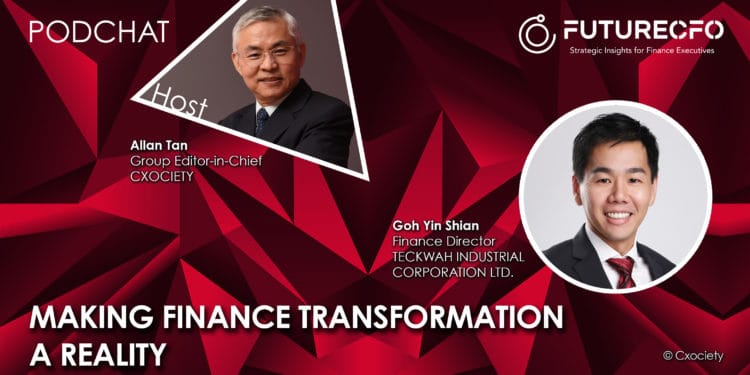Finance leaders are increasingly focused on digital transformation initiatives despite having to deal with other pressing issues like revenue, profitability, and skills shortage during these periods of continuing uncertainty.
Granted we’ve had two years to adjust to the new ways of doing business and working, uncertainties are always more pronounced during times of heightened crisis – as when there is a new round of infection outbreak.
The 2021 Gartner CEO Survey: The CFO Perspective noted that 82% of CFOs report investments in digital are accelerating, exceeding investments in other areas like talent, supply chain, business services or fixed assets.

Responding to FutureCFO’s quest to understand what digital transformation is from the context of the finance function, Goh Yin Shian, finance director for Teckwah Industrial Corporation, acknowledges that transformation is a holistic endeavour.
“To be more holistic, you do not just stay within the work scope of your team but also understand available technologies and processes out there and find ways to improve. You must move along with the times which is why many companies have moved to activity-based budgeting as well as work together as a team to make their processes smoother,” he explained.
What exactly is the role of finance in a digitally transformed enterprise?
Goh Yin Shian: The role of finance in a digitally transformed enterprise consists of business partnerships, working alongside operations, sales, and other parts of the business. It is the finance that shows the progress and the success of the business, so it has to be involved in discussions from planning to execution of business plans.
Do you believe that this so-called continuous process optimization is the foundation for sustained competitive advantage?
Goh Yin Shian: Yes. Not only does it helps your current process but also with career development and retention of staff. When hiring, candidates question the purpose of the organisation that is not future-ready as they want to be part of a team that is continuously looking for ways to improve, especially at a time like now with Covid, automation has helped the staff with their work.
Reviewing your processes and technology direction, what would be one area where you think that you could see a bit more improvement or maybe even make changes?
Goh Yin Shian: The area of working across departments. It is an enterprise-wide effort to have everyone go beyond their work responsibilities and understand internal goals for the business to grow and to meet staff and customers’ expectations. Being open to feedback can also help companies notice areas that need improvement.
How would you rate your finance team’s competency to drive successful transformation and if there is any one area that you think the team struggles with the most?
Goh Yin Shian: People working in finance are generally introverts. They stick to their work and struggle to get experience outside of their team which I understand is difficult as we are already very busy. But you must look at the benefits of getting the experience and exposure. You get to challenge yourself and see how things are now different.
Do you believe the finance function is equipped to meet the sustainability objectives of the enterprise or the company?
Goh Yin Shian: It is a relatively new topic for everyone. To be fully equipped, review sustainability efforts by various organisations across countries. Find and apply the ones that are aligned with your country or region but of course, it is difficult to satisfy everyone. It is an ongoing process and it may in the future be part of our auditing process.
Where do you expect your focus as finance head will be in 2022?
Goh Yin Shian: Sustainability. To have a better understanding of how to incorporate it into our business because it is common for customers and vendors to ask about our sustainability efforts. They want to see evidence that organisations are putting in work and resources to be sustainable.
Where is the finance organisation in terms of its transformation journey?
Goh Yin Shian: We are ahead of some of the organisations. It largely depends on the maturity of the organisation. For new organisations, change is a lot faster because they do not have legacy systems but mature organisations, are dependent on legacy processes and are likely hesitant to change. It becomes easier once you start the journey.
If the overarching goal of finance is to create a sustainable transformation of finance, what do you think needs to happen?
Goh Yin Shian: The first is to ensure that everyone understands what it is and why it is important. I would suggest organisations move bottom-up in terms of discussion on a sustainable transformation of finance, so you gather support along the way because it is difficult to start the process. But once you kick off, everything else will fall in place.
Click on the PodChat and listen in detail to elaborate on making finance transformation a reality.
- Do you need to transform finance to enable (facilitate) a more holistic business transformation?
- What is the role of finance in a digitally transformed enterprise?
- Do you believe that continuous process optimization is the foundation for sustained competitive advantage?
- Reviewing your process and technology direction, what one area would you like to see improved/changed upon?
- How would you rate your finance team’s competency to drive successful transformation? Which one area do you think the team struggles with the most?
- Do you believe you are equipped to meet your sustainability objectives?
- Where do you expect your focus (as finance) will be in 2022? [sustainability]
- Where is the finance organisation on its transformation journey?
- If the overarching goal is to create a sustainable transformation of finance, what more needs to happen?




